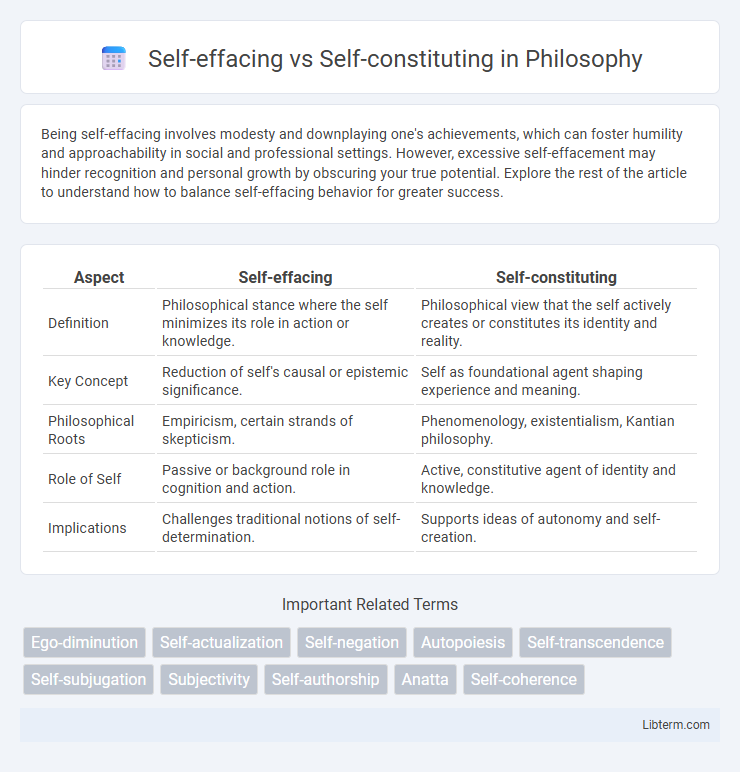Being self-effacing involves modesty and downplaying one's achievements, which can foster humility and approachability in social and professional settings. However, excessive self-effacement may hinder recognition and personal growth by obscuring your true potential. Explore the rest of the article to understand how to balance self-effacing behavior for greater success.
Table of Comparison
| Aspect | Self-effacing | Self-constituting |
|---|---|---|
| Definition | Philosophical stance where the self minimizes its role in action or knowledge. | Philosophical view that the self actively creates or constitutes its identity and reality. |
| Key Concept | Reduction of self's causal or epistemic significance. | Self as foundational agent shaping experience and meaning. |
| Philosophical Roots | Empiricism, certain strands of skepticism. | Phenomenology, existentialism, Kantian philosophy. |
| Role of Self | Passive or background role in cognition and action. | Active, constitutive agent of identity and knowledge. |
| Implications | Challenges traditional notions of self-determination. | Supports ideas of autonomy and self-creation. |
Understanding Self-Effacing: Definition and Key Traits
Self-effacing individuals exhibit humility by minimizing their own importance and avoiding attention, often characterized by modesty and a reserved demeanor. This trait emphasizes a lack of self-promotion and an inclination to let others take the spotlight, reflecting a preference for harmony over dominance. Understanding self-effacing behavior involves recognizing its role in social interactions, where it can foster trust and cooperation through subtle self-denial.
What Does It Mean to Be Self-Constituting?
Being self-constituting means that an individual's identity and values are actively shaped by their own choices and actions, rather than being defined solely by external influences or social roles. This concept emphasizes autonomy and the capacity for self-creation, where personal agency constructs the framework of one's existence. Unlike self-effacing tendencies that minimize the self, self-constituting affirms the self as a dynamic, intentional source of meaning and purpose.
Historical Perspectives on Self-Identity
Historical perspectives on self-identity reveal a critical distinction between self-effacing and self-constituting views, where self-effacing theories emphasize the minimizing of ego and externalizing identity to social or relational contexts. In contrast, self-constituting perspectives assert that individuals actively construct their own identity through internal coherence and personal agency, as seen in the existentialist philosophies of Sartre and Heidegger. This tension reflects broader debates in psychology and philosophy regarding the source of identity, whether it arises from external influences or is primarily shaped by an autonomous self.
Psychological Foundations of Self-Effacing Behavior
Self-effacing behavior stems from psychological foundations such as low self-esteem, fear of social judgment, and a desire to maintain social harmony by minimizing one's own achievements. This contrasts with self-constituting actions, where individuals assert their identity and agency to establish a coherent sense of self. Understanding self-effacing tendencies involves exploring cognitive biases and emotional regulation mechanisms that drive people to downplay their successes and defer attention to others.
The Philosophy Behind Self-Constitution
Self-constituting actions define an individual's identity by shaping their values, intentions, and agency through active commitment, contrasting with self-effacing behaviors that diminish or obscure the self's role in decision-making. The philosophy behind self-constitution emphasizes autonomy and authenticity, where personal identity emerges from deliberate choices rather than passive acceptance. This concept is central to existentialist and phenomenological frameworks, highlighting the dynamic process of self-creation and moral responsibility.
Self-Effacing vs Self-Constituting: Core Differences
Self-effacing agents deny that their own existence or actions partly constitute the properties or facts they engage with, viewing themselves as external observers. Self-constituting agents, by contrast, recognize that their existence and actions play an essential role in shaping or bringing about those properties or facts. The core difference lies in whether the agent's involvement is seen as merely contributory and external (self-effacing) or as fundamentally creating and defining the reality involved (self-constituting).
Impacts on Decision-Making and Personal Growth
Self-effacing behavior often leads to diminished confidence and reliance on external validation, which can hinder assertiveness and slow personal growth. In contrast, self-constituting attitudes promote autonomous decision-making, fostering resilience and a stronger sense of identity. Embracing self-constitution encourages proactive choices that align with authentic values, driving continuous development and empowerment.
Societal and Cultural Influences Shaping the Self
Societal and cultural influences profoundly shape the self by either promoting a self-effacing identity, where individuals prioritize community and humility, or encouraging a self-constituting identity focused on personal autonomy and self-expression. Collective cultures often emphasize relational interdependence, leading to self-effacing behaviors that align with social harmony and shared values. In contrast, individualistic cultures nurture self-constitution by valuing independence, personal achievement, and the construction of a unique self-narrative.
Navigating Relationships: Self-Effacing vs Self-Constituting Individuals
Self-effacing individuals navigate relationships by prioritizing humility and deference, often minimizing their own needs to maintain harmony and avoid conflict. In contrast, self-constituting individuals assert their identity and boundaries clearly, fostering relationships based on mutual recognition and authentic self-expression. Understanding these contrasting approaches helps in managing interpersonal dynamics and achieving balanced connections.
Finding Balance: Integrating Both Approaches for Wellbeing
Finding balance between self-effacing and self-constituting approaches enhances overall wellbeing by fostering humility while maintaining personal agency. Integrating self-effacing attitudes reduces ego-driven stress, whereas self-constituting behaviors promote autonomy and purposeful living. Combining these strategies supports mental health through adaptive self-awareness and empowered decision-making.
Self-effacing Infographic

 libterm.com
libterm.com